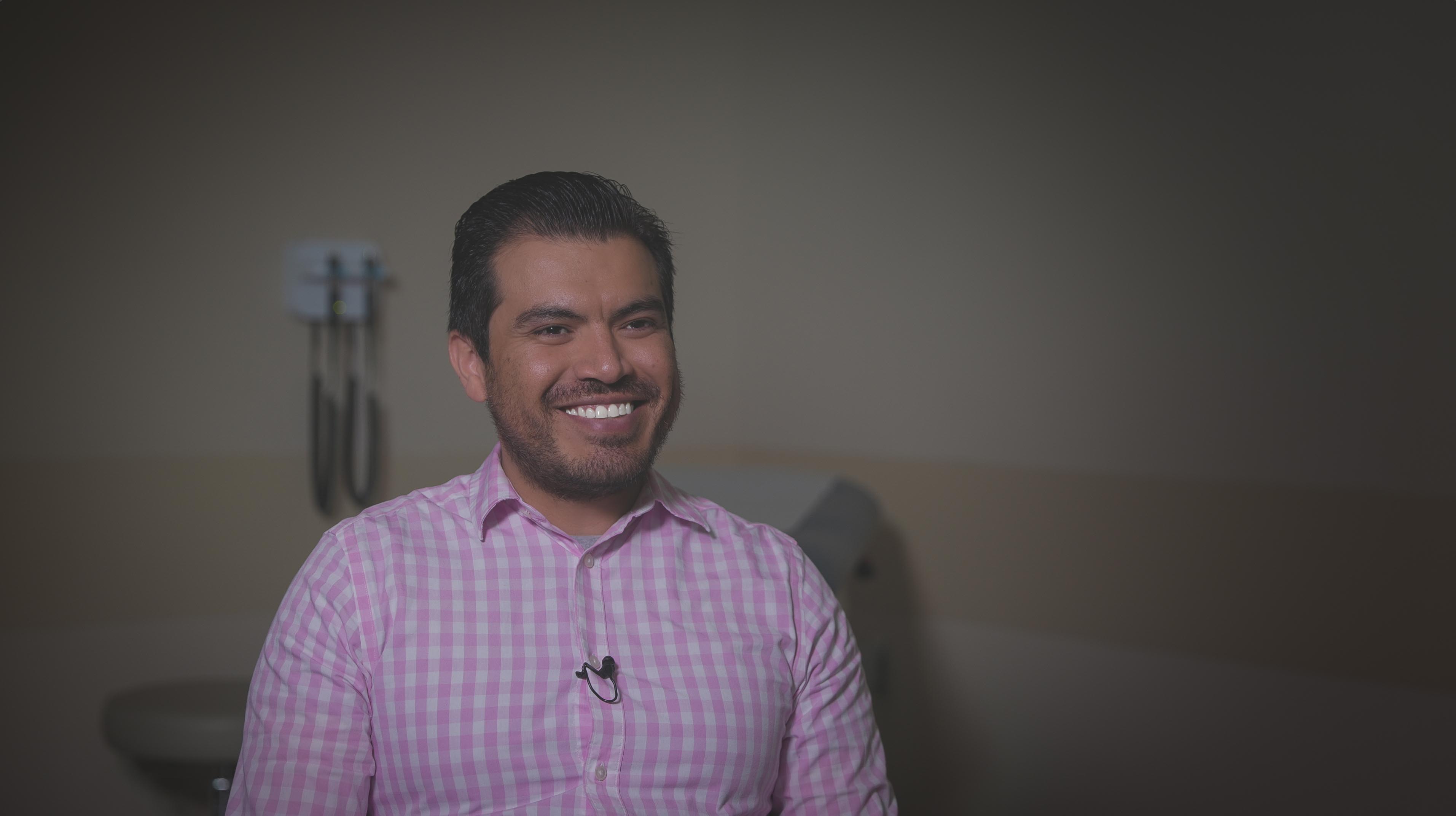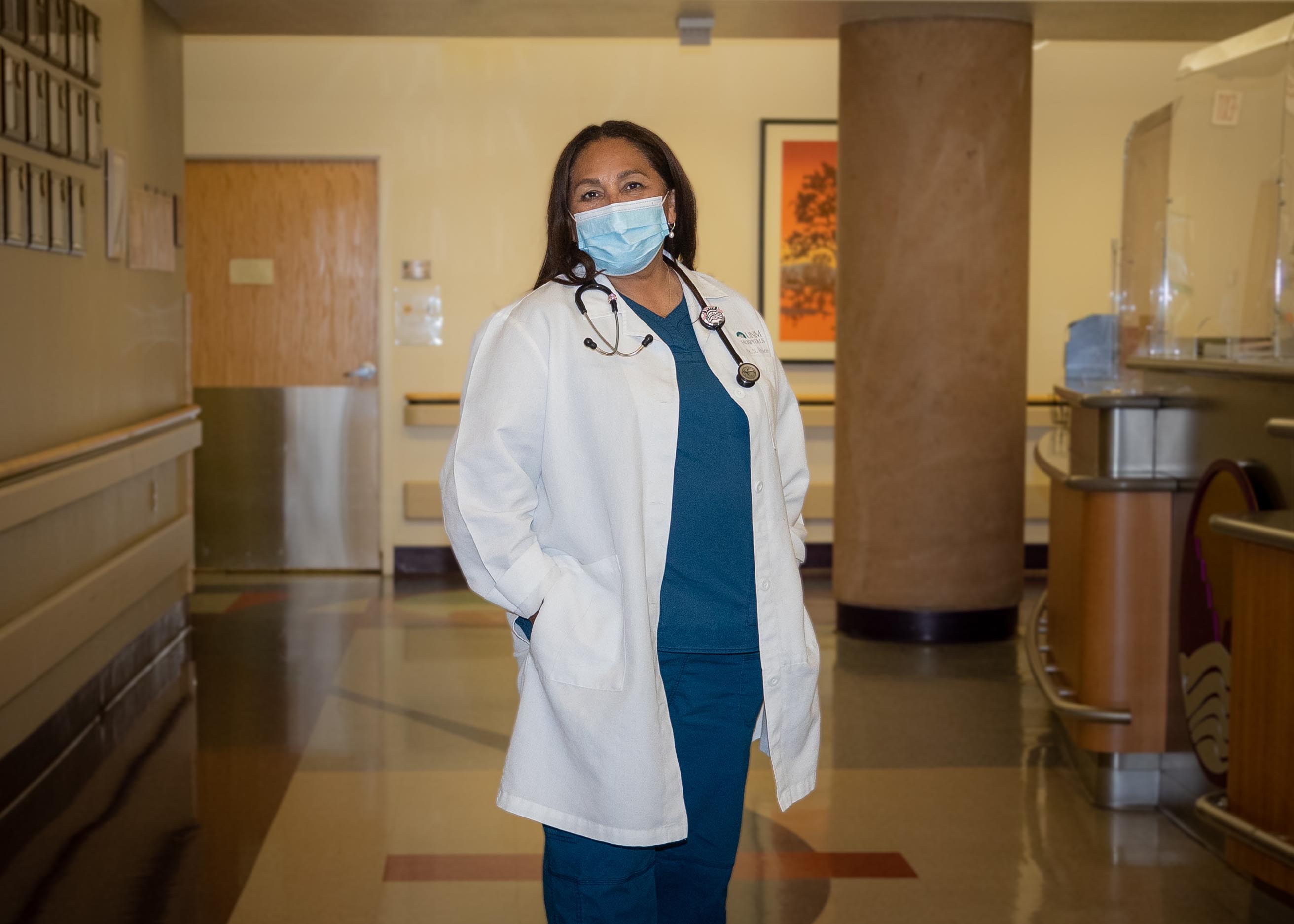Nurse practitioners are often the only health care providers available in many of New Mexico’s underserved and rural areas. For the past 30 years they have had full prescriptive authority and can practice without a physician’s supervision.
Nov. 13-19 is Nurse Practitioner Week, which raises awareness of the part these health care providers play in ensuring general health and well-being.
“Nurse practitioners play a vital role in health care across the state to all age ranges and in numerous specialties, including primary care,” said Carolyn Montoya, PhD, RN, PNP-PC, FAANP, FAAN, interim dean and professor at The University of New Mexico College of Nursing.
The College of Nursing offers several nurse practitioner pathways: the master of science in nursing (MSN), the post-MSN doctor of nursing practice (DNP), and the post-baccalaureate DNP programs.
Graduate nursing students gain increased breadth and depth of knowledge in clinical, leadership and health systems thinking skills needed to address the state’s increasingly complex health care needs, especially in rural and under-resourced communities.
Nurse practitioners’ presence in the workforce increases New Mexicans’ access to health care services, Montoya said.
In New Mexico, employment for nurse practitioners is expected to grow by 27.5%, more than four times the statewide average of 6.3% for all occupations, she said. “Now is a great time to become a nurse practitioner.”
Here are three accounts that highlight different facets of the profession.
Marcos Perez Estrada, BSN, RN
College of Nursing MSN Family Nurse Practitioner Student
After suffering a traumatic brain injury in a kickboxing class when he was 16, Marcos Perez Estrada had no idea a hospital stay would change the trajectory of his life.
The emergency room doctor took one look at Estrada and assumed, based on his race and age, that he had overdosed on drugs.
As Estrada lay in the hospital bed, having forgotten his native Spanish and then English, unable to remember his own name, he couldn’t defend himself against the baseless accusation. His mom was upset at the doctor’s preconceived biases, so toxicology tests were ordered and came back clear.
What should have been a teachable moment for a health care provider instead became a pivotal moment in Estrada’s life.
“A week later, when my mom told me what happened, I was just devastated,” Estrada said. “I promised her I would make a difference in that. Basically, what I'm trying to do now is just make a difference for me, for my family and my culture.”
Estrada is currently a UNM College of Nursing student in the family nurse practitioner master's program.
“I absolutely love the instructors,” he said. “They are all willing to teach you and take extra time to explain things. It’s been an amazing experience here.”
One of the most rewarding experiences at the College of Nursing so far has been taking pediatrics classes, Estrada said.
“I was afraid of pediatrics,” he said. “But getting that exposure absolutely made me fall in love with it. I really like the connection you make with a kid and then the parent, and now you have a whole picture of the family.”
Originally from Mexico, Estrada came to the U.S. when he was 10 years old. Once he becomes a practicing nurse practitioner one of his goals is to serve the Spanish-speaking population and help Spanish-speaking patients overcome the language barrier when it comes to accessing health care.
“Focusing more on good quality of care for any population – that would be probably my main end goal,” he said. “I think it's important for all of us, especially in New Mexico, to know about the different cultural backgrounds and respect that and learn about them so we don't make somebody else feel like my mom felt.”
Sylvia Price, BSN, DNP, FNP-C
NP at UNM Hospital
Sylvia Price loves caring for babies.
Working as a nurse practitioner in the Mother-Baby Unit and the Newborn Clinic at UNM Hospital, Price has been able to turn her passion for neonatal care into a career.
“Being able to take care of babies and moms and their families is just such an honor. The families trust us and trust me with taking care of their baby,” Price said. “That just brings a lot of joy to me personally and professionally.”
Price received her BSN and MSN degree with a concentration in family nurse practitioner from the College of Nursing and worked as a registered nurse and then a family nurse practitioner for two decades. Her education was an invaluable experience and working at UNMH helped further hone her skills, she said.
“As a family nurse practitioner, my education was very intense and pretty broad, from age zero all the way to 99.5. It had to be broad,” she said. “Upon graduation from UNM, I had some preceptors when I got hired on to the hospital who helped me to learn even more of the specialty.”
About seven years ago, Price went back to school at the College of Nursing and received her DNP and has continued working as a nurse practitioner at UNMH.
“I pursued getting my doctorate because I wanted to be at the top of my profession. I'm always competitive with myself and I’m always wanting to be on top of what's going on in nursing,” she said. “And as a terminal degree, I think that it really helps me to be a better provider and more knowledgeable. I’m constantly learning and just sharing what I know with the families and giving them the best care that they deserve.”
Price is just one part in a large team of nurses, doctors, midwives, social workers, lactation specialists and more that care for babies and their families at UNMH. She sees four or five newborn babies on an average workday, doing exams, evaluating the babies and checking in on any concerns.
“It's a very busy day, but it's very rewarding and I'm always just so thankful and grateful to be able to do what I do,” she said. “I made the right choice to be in health care. Throughout the 37 years that I've been in health care, it just seems like it continues to reinforce that.”
Lori Ann Romero, RN, BSN, FNP
NP at Optum
Every workday morning, Lori Ann Romero makes sure her car is packed with everything she needs for her 100-plus-mile round-trip journey to see patients.
Romero currently works as a home health care provider for Optum, where she goes into patients’ homes, answers health-related questions, performs a physical exam and offers health screenings. She sees an average of six patients a day, and primarily provides health care services for the Medicare and Medicaid population in Bernalillo and Valencia counties. Several of her patients are housebound due to physical health or because they do not have access to transportation.
As a nurse practitioner who makes house calls, Romero can assess social determinants that may prevent a patient’s access to health care that would have otherwise go unnoticed in a clinic setting.
“There was one patient I visited who had COPD (chronic obstructive pulmonary disease) and used an oxygen concentrator, which needs electricity to work,” she said. “When I got to his house, it was so cold. He told me he wasn’t able to pay his electric bill that month and that it had been turned off.”
In New Mexico, doctors and nurse practitioners can submit medical certifications to electric companies stating that a lack of access to electricity would impair the patient’s health. So, Romero contacted the electric company and had the electricity turned back on.
“If I saw him in a clinic, I would have never heard about that,” she said. “These are the types of things that you don’t see in a clinic and going into someone’s home can give a bigger picture of a patient’s health issues and needs.”
Romero first thought about becoming a nurse practitioner while volunteering at a clinic in Mora County, where she’s from.
“For some reason, I just felt that pull more to the nurses,” she said. After graduating with her BSN from the College of Nursing in 2001 and working as a registered nurse for several years, her NP coworker encouraged her to further her career.
“I decided to take that route because a nurse practitioner can practice on their own,” she said. “Unlike a physician’s assistant, who has to work under a doctor, nurse practitioners in our state can actually run their own clinic and have that autonomy and independence.”
She went back to school and received her MSN degree as a family nurse practitioner from the College of Nursing in 2012.
“The College of Nursing really prepared me for what being a nurse and being a nurse practitioner was really going to be like. I think it was all those clinic hours we had to do,” she said with a laugh. “I’ve felt prepared in every role I’ve ever gone into as a nurse.”



